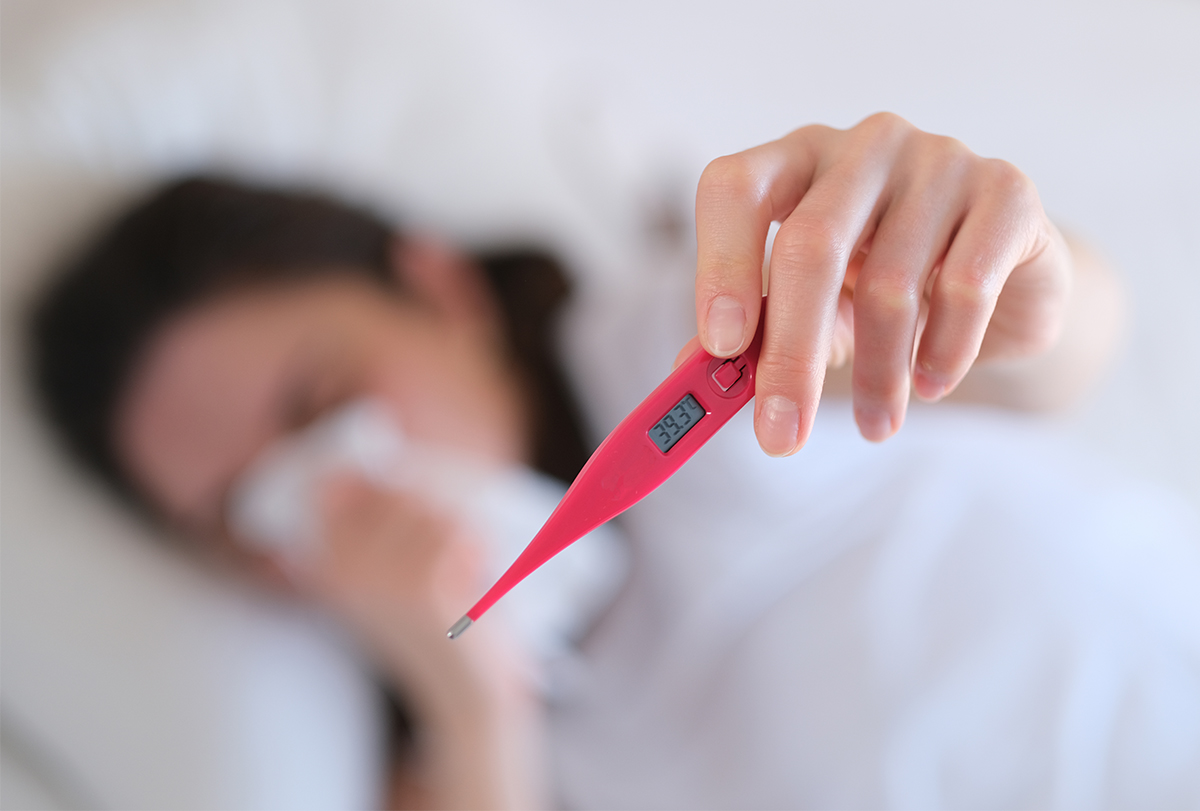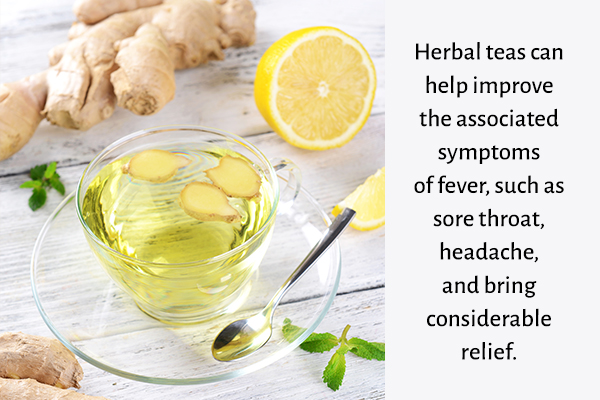In this article:
When the body temperature rises above the normal 98.6°F, it is considered to be a fever. It is important to note that fever is not a disease but an indication that your body is fighting an infection or illness.

The action of the body’s immune system to kill infectious microbes raises your body temperature for efficient function. This article discusses various methods to help manage and prevent a fever at home.
Home Remedies for Fever
Various at-home treatments may help manage a fever. However, most of these remedies are based on anecdotal evidence and are not supported by scientific studies.
You can use these treatments as an adjunct to medical treatments for low-grade fevers. It is best to consult a doctor if you have a high-grade fever or if your child is running a fever.
1. Sponge your body
Sponging is perhaps the most frequently used home treatment for bringing down a fever without the use of medicines. (1)
This easy-to-do remedy is typically used when preliminary treatment with acetaminophen or ibuprofen fails to lower a particularly high fever (104°F/40°C or above), including fever brought on by a heatstroke.
Here is the recommended way to sponge your body:
- Drench a clean sponge or washcloth in fresh tap water and then squeeze or wring out the excess water.
- Use the wet sponge or washcloth to wipe your forehead, armpits, feet, hands, and groin where the blood vessels lie closer to the surface of the skin.
- Sponge your body this way for at least 30–45 minutes to relieve the fever.
- If you are using a washcloth for sponging, make sure to change the cloth piece regularly.
Note: Always use lukewarm water for sponge baths as well as general bathing as it helps to gradually bring down the fever instead of causing any drastic fluctuations. Rubbing alcohol is not recommended for sponging or baths.
2. Drink herbal teas

It is vital to keep yourself hydrated in order to break a fever. While water is essential, you can also consume herbal teas as they possess added benefits.
Try drinking ginger tea, (2) lemon and honey tea, or green or peppermint tea when running a fever. You can also add black pepper (3) or raisins to the tea.
While herbal teas may not help cure a fever, they can help improve the associated symptoms, such as sore throat and headache and bring considerable relief.
3. Take OTC medications
There aren’t any medications to cure fever, but some can help bring it down temporarily, reduce its intensity, and ease the accompanying symptoms.
Acetaminophen and nonsteroidal anti-inflammatory drugs (NSAIDs), such as ibuprofen, are the most commonly used drugs to manage a fever. These are available without a prescription and are safe for both children and adults when taken in the proper dosage.
However, aspirin is one fever medication that should not be given to young children to avoid a rare but life-threatening condition called Reye’s syndrome.
You may also use other OTC medications such as decongestants to relieve nasal and chest congestion as well as antihistamines to reduce respiratory inflammation. These additional discomforts frequently occur along with flu-related fever and can lead to labored breathing and general respiratory distress.
Taking the right combination of these OTC meds can help make your fever-ridden body more comfortable, but this kind of self-treatment may not be enough to overcome the underlying viral infection. Thus, you must consult a doctor if you run a high fever or if your condition fails to improve despite these preliminary measures.
Caution: OTC medications should be taken following the label instructions or doctor’s recommendation. High doses or prolonged use of acetaminophen or ibuprofen can damage your liver and kidneys, while acute overdoses can prove deadly.
Self-Care Measures
Here are a few ways to help you cope with a fever at home.
1. Get some rest

A fever can make you feel overwhelmingly exhausted and restless at all times. The characteristic malaise and generalized weakness that accompany a fever are your body’s way of telling you that you need to rest.
So, when you are down with a fever, you must try to conserve energy by spending more time in bed and less time running about. Overexerting your already ailing body can leave you with no energy to fight the underlying infection.
2. Keep your fluid intake in check
A high body temperature can cause increased water loss from the body in the form of excessive sweating and excretion through the urine. Thus, you have to consume more fluids to maintain a healthy water balance inside the body, or else you run the risk of getting dehydrated. (4)
If your urine turns unusually pale, chances are that your kidneys are filtering out excessive amounts of water from the body. (5)
Besides drinking a minimum of 7–8 glasses of water, you may also include the following in your diet:
- Soup
- Ice pops
- Flavored gelatin
- Unprocessed, unsweetened fruit and vegetable juices
- Water-rich fruits and vegetables
Avoid the following beverages during a fever:
- Caffeinated beverages, which are known to increase urination
- Water or any drink that is colder than your internal body temperature
- Alcohol as it can further dehydrate your body
3. Check your environment
Keep your living space comfortably cool and properly ventilated. If your room feels congested, you can place a standing fan close to your bed to keep the cool air moving.
4. Wear light, airy clothes
Wearing multiple layers of clothing or heavy fabrics can trap the body heat and prolong the fever. So, it is recommended to wear loose, flowy clothes that are made of lightweight fabrics such as cotton or linen.
5. Prevent the spread of infection
If your fever results from a highly contagious infection such as the common cold, flu, or chickenpox, you must exercise the necessary precautions and personal hygiene to avoid spreading it to others as well as to expedite your own recovery.
- Avoid going to crowded places or being in close contact with other healthy individuals, particularly children and the elderly.
- Cover your mouth and nose while coughing or sneezing.
6. Avoid smoking
Smoking can compromise your body’s ability to fight off the infection and can extend the recovery process. So, it is best that you give up this habit, at least for as long as the fever persists.
Most-Asked Questions About a Fever

Are egg whites useful in managing a fever?
While the use of egg whites for breaking a fever is not suggested by any scientific study, it has been popularly used as an anecdotal remedy. Therefore, you may try using egg whites if you are not allergic to it.
Eggs whites are generally used to soak a pair of socks that are then worn on the feet.
Alternatively, egg whites are applied to paper towels that are placed on the bottom of the feet. This is believed to help lower a fever within an hour. You may also use a potato in place of an egg.
Can apple cider vinegar help break a fever?
Apple cider vinegar has also been used anecdotally in managing a fever, but its use is not supported by any scientific research.
This remedy generally involves soaking two washcloths in diluted apple cider vinegar and placing them on the forehead and stomach.
Final Word
While fevers cause great discomfort to the body, they are usually indicative of a well-functioning immune system. You can easily manage mild to moderate fevers using simple home remedies and interventions.
Most fevers generally resolve within a few days. However, if the high temperature is persistent or continues to rise despite self-care, you must consult a doctor.

- Was this article helpful?
- YES, THANKS!NOT REALLY



